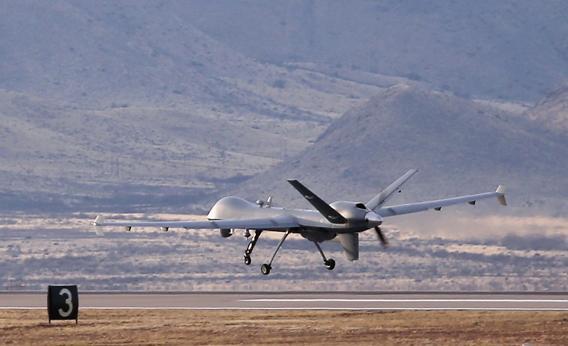The Obama White House is shifting control of the secret drone-strike program out of the CIA and back to the military, according to a story that ran in the Daily Beast on Tuesday and another that appeared in today’s Wall Street Journal. The question that comes to mind: So what?
Given the intricate entanglements between the two in the past decade’s war on terror, does it matter whether a spymaster at Langley or a cabinet chief in the Pentagon is responsible for targeted assassinations on foreign terrorists from the sky?
Maybe. The shift could mean new restrictions and an extra layer of accountability on drone strikes, subjecting them to an entirely different command culture. Or it could have very little effect. It all depends on how the shift in power is written.
Let’s back up. Under today’s practice, the military controls the drones flying over Afghanistan because U.S. armed forces are officially at war in that country and drones are weapons in their arsenal. (The same was true of the drones over Iraq when U.S. troops were fighting there.) However, the CIA controls the drones flying over Pakistan, Yemen, and certain other countries because they are not official war zones; the drones are playing a role in covert operations (for that reason, the drone flights themselves are classified), and covert ops are the CIA’s business.
To put it in legal terms, drone strikes in Afghanistan fall under Title 10 of the U.S. Code, which sets rules for the armed forces, while drone strikes in countries outside of official war zones fall under Title 50, which provides authority for covert operations. It defines covert actions as activities “to influence political, economic, or military conditions abroad” without the appearance or acknowledgment of a U.S. government role—adding that these actions do “not include traditional military activities.”*
Shifting control of drone strikes from the CIA to the military essentially means shifting authority for those drone strikes from Title 50 to Title 10. It places them under the rubric of “traditional military activities”—and the standards and practices of U.S. armed forces. One implication of this is that it will be harder to justify drone strikes in areas where U.S. troops are not openly at war. It also means that if a president contemplates stretching the limits of Title 10—that is, if he or she considers drone strikes outside war zones—the military’s lawyers will get involved, and they tend to be more scrupulous than CIA lawyers (who, after all, deal with overseas covert actions, which often skirt, or ignore, U.S. law). One pertinent provision of Title 10 is that, in order for U.S. armed forces to operate on foreign soil, they must get permission of the local government. If the military controlled drone strikes, they couldn’t be ordered without this permission.
However, there are two ways around these strictures. First, there have been occasions when presidents—including President Obama—have simply (and legally) declared that certain members of the armed forces are, for the moment, acting under Title 50. Most notably, when Navy SEALs raided Osama Bin Laden’s compound in Pakistan, they were declared to be under CIA command. Therefore, they did not need the Pakistanis’ permission to cross the border. The same abracadabra could be recited for drone operators.
Or maybe the president wouldn’t even have to go that far. SEALs, like Delta Force and other “shadow” forces, are part of the Joint Special Operations Command. JSOC is part of the armed forces; it therefore falls under Title 10. However, under an executive order signed by President George W. Bush (and still in effect), it has authority to conduct secret operations against al-Qaida and affiliated terrorist networks worldwide.
So, if control of drone strikes is shifted from the CIA to the military and the military decides to assign the mission to JSOC, the strikes might be as frequent and far-flung as ever—maybe even more so, since Bush’s executive order allows JSOC to conduct its operations without consulting or notifying Congress. (By contrast, under Title 50, the CIA has to tell the congressional intelligence committees about its covert operations.)
The motive behind the shift may have less to do with the controversy over drone strikes than with the future of the CIA. John Brennan, the agency’s new director (and a career agency officer), said at his Senate confirmation hearings that the CIA “should not be doing traditional military activities and operations.” The statement’s meaning was ambiguous; it depends on how he defines “traditional military operations.” But he made it in the context of drone strikes. And as the White House counterterrorism chief during Obama’s first term, Brennan told several people that he would like to see the CIA pull back on some of its paramilitary operations and focus more on its original tasks of espionage and analysis.
The shift’s effect on drone strikes, then, is still a bit vague—all the more since the Wall Street Journal and The Daily Beast report that it will take place gradually. Whether this means over the course of weeks, months, or years isn’t said (or probably known). The New York Times, catching up with the story, further reports this afternoon that Obama hasn’t yet decided whether to order the shift—and that, in any case, the CIA might retain control of drone strikes on Pakistan, which, if true, would mean the shift wouldn’t be much of a shift after all.
It all depends, then, on what President Obama wants to be able to keep doing. Since presidents tend not to give up executive powers unilaterally, the shift—in terms of its actual effects on drone strikes—is likely to be slight.
Correction, March 22, 2013: This article originally omitted the word conditions in the quote from Title 50 “to influence political, economic, or military conditions abroad.” (Return to the corrected sentence.)
